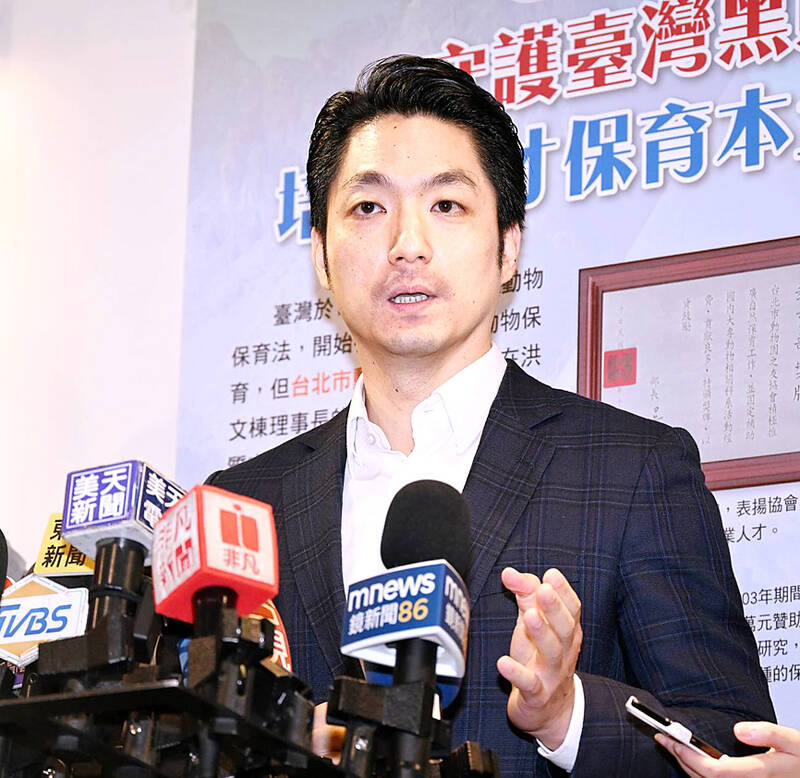The Taipei City Government has convened an ad hoc committee to consider halting the Core Pacific City (京華城購物中心) redevelopment project, as reports indicated that Taipei prosecutors would soon wrap up their corruption probe into the development and announce formal charges.
Headed by Taipei Deputy Mayor Lee Ssu-chuan (李四川), the committee would assess the outcome of the probe and any charges filed before determining a course of action, including halting construction, Taipei Mayor Chiang Wan-an (蔣萬安) told reporters yesterday.
The committee includes officials from the Taipei Department of Urban Development, Taipei Construction Management Office and other city agencies, including the departments of legal affairs and government ethics, along with experts and academics, Chiang said.

Photo: Fang Pin-chao, Taipei Times
The investigation into the development of Core Pacific City, also known as Living Mall, in Taipei’s Songshan District (松山) started amid suspicion about the sharp increase in the floor area ratio (FAR) from 560 percent to 840 percent during Taiwan People’s Party Chairman Ko Wen-je’s (柯文哲) tenure as mayor from 2014 to 2022.
Ko has been detained and held incommunicado without charge for more than 100 days as part of the probe.
He is among more than 20 people being investigated in relation to the development, including other city officials and Core Pacific Group (威京集團) founder and chairman Sheen Ching-jing (沈慶京), who prosecutors said paid NT$47.4 million (US$1.45 million) in bribes to sway government officials to increase the FAR.
Taipei Department of Urban Development officials had said they would meet within two weeks of a formal indictment, and based on the investigation would rescind portions of the FAR and revoke the project’s permit.
Taipei City Councilor Miao Po-ya (苗博雅) of the Social Democratic Party said Chiang and his administration had been dragging their feet in responding to the probe.
“They should not wait for an indictment to decide to revoke the project’s construction permit,” she said.
The Control Yuan already conducted an investigation and determined that the project had contravened land use and development regulations stipulated under the Urban Planning Act (都市計畫法), she said.
“Chiang and city officials have been too slow and taken action too late,” Miao said, adding that although most people are aware of the accusations, Chiang was waiting on a formal indictment.
“Maybe he will say: ‘Let us wait until the appeals and the final verdict on the case,’ before the city government would conduct an investigation and take appropriate measures,” she said.
“Taipei residents would not accept such a delayed response from Chiang. He and the city government are clearly waiting to find excuses to protect corporations, to drag out the process to allow the project’s completion,” she added.

Taiwan has received more than US$70 million in royalties as of the end of last year from developing the F-16V jet as countries worldwide purchase or upgrade to this popular model, government and military officials said on Saturday. Taiwan funded the development of the F-16V jet and ended up the sole investor as other countries withdrew from the program. Now the F-16V is increasingly popular and countries must pay Taiwan a percentage in royalties when they purchase new F-16V aircraft or upgrade older F-16 models. The next five years are expected to be the peak for these royalties, with Taiwan potentially earning

STAY IN YOUR LANE: As the US and Israel attack Iran, the ministry has warned China not to overstep by including Taiwanese citizens in its evacuation orders The Ministry of Foreign Affairs (MOFA) yesterday rebuked a statement by China’s embassy in Israel that it would evacuate Taiwanese holders of Chinese travel documents from Israel amid the latter’s escalating conflict with Iran. Tensions have risen across the Middle East in the wake of US and Israeli airstrikes on Iran beginning Saturday. China subsequently issued an evacuation notice for its citizens. In a news release, the Chinese embassy in Israel said holders of “Taiwan compatriot permits (台胞證)” issued to Taiwanese nationals by Chinese authorities for travel to China — could register for evacuation to Egypt. In Taipei, the ministry yesterday said Taiwan

Taiwan is awaiting official notification from the US regarding the status of the Agreement on Reciprocal Trade (ART) after the US Supreme Court ruled US President Donald Trump's global tariffs unconstitutional. Speaking to reporters before a legislative hearing today, Premier Cho Jung-tai (卓榮泰) said that Taiwan's negotiation team remains focused on ensuring that the bilateral trade deal remains intact despite the legal challenge to Trump's tariff policy. "The US has pledged to notify its trade partners once the subsequent administrative and legal processes are finalized, and that certainly includes Taiwan," Cho said when asked about opposition parties’ doubts that the ART was

If China chose to invade Taiwan tomorrow, it would only have to sever three undersea fiber-optic cable clusters to cause a data blackout, Jason Hsu (許毓仁), a senior fellow at the Hudson Institute and former Chinese Nationalist Party (KMT) legislator, told a US security panel yesterday. In a Taiwan contingency, cable disruption would be one of the earliest preinvasion actions and the signal that escalation had begun, he said, adding that Taiwan’s current cable repair capabilities are insufficient. The US-China Economic and Security Review Commission (USCC) yesterday held a hearing on US-China Competition Under the Sea, with Hsu speaking on